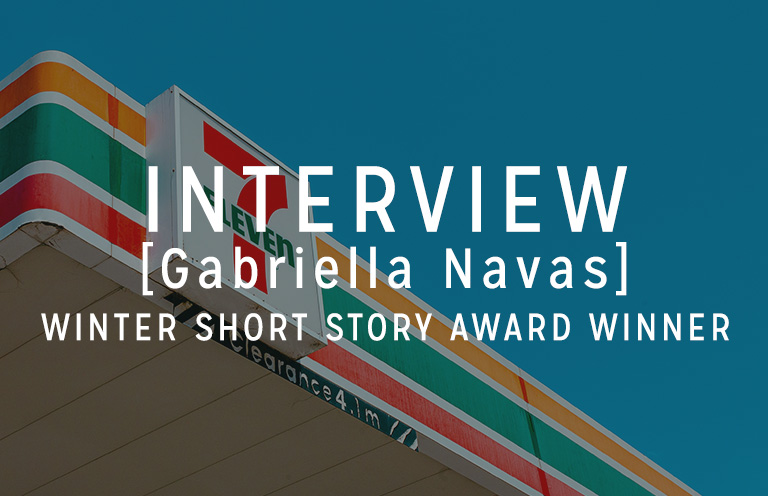Tell Me Who You Walk With by Gabriella Navas took first place in our Winter Short Story Contest. Read the winning story here, then read this interview with Navas in which she talks about loneliness, women’s friendships, and writing routines—or the lack thereof.

Your characters as well as the setting are so well-drawn in this story. Which came first for you, or did they all arrive simultaneously?
For this particular story, the characters most definitely came first, but admittedly I’ve never been the kind of writer who knows exactly who my characters will be from beginning to end. I don’t tend to give my characters detailed backgrounds before I begin writing them; I like to discover their pasts and who they are the longer I spend time with them, and the more life happens to them. Depending on my goals when writing something, setting usually comes second.
This story feels predominately about loss, but also about surviving loss. Can you talk a little about that, and if you, like me, felt hopeful at the end?
I started writing this story back in 2020, back when I had been having these very intense and sustained feelings of loss in the aftermath of Hurricane María in Puerto Rico, and I didn’t know what to do with them. I was in the process of applying to grad school during the pandemic, and this was the story I decided to write in order to make sense of those feelings. At the time, I truly believed this was the beginning of a novel, so it was interesting to revisit it as a standalone story when I decided to submit it to The Masters Review. If you’d asked me back then if I thought this ending was hopeful, I probably would’ve said no! But after having some distance, I do see Priscila’s journey as a more hopeful one.
I love the relationship between Marie and Priscila. Was it your intention as you started to write this story to have these very opposite, but in some ways equally lonely, women’s relationship play a major part in the story?
When I started writing Marie’s character, the intention was for her to be this sort of mirror for problematic white womanhood, especially since Priscila is coming to Georgia from the East Coast, where things and people can be so culturally different. Even though Priscila is half-white in the story, she is immediately othered when she arrives in Georgia, and I think we see that in her interactions with Marie. This, of course, leaves her with a choice: to assimilate or not to assimilate. So there’s this way in which I wanted to use Marie to both highlight their differences and also to hold Priscila accountable for the ways she might begin to cling to her own whiteness when it serves her now that she’s in this new place. If the story was longer, I think I might have tried to expand on that, but I do feel like the relationship between Marie and Priscila, as it exists in this story, is nuanced enough to at least broach those kinds of conversations.
What’s your writing routine like (if you have one)? Are you an every-morning writer, or a catch-me-as-you-can writer, or something in between?
This is my most dreaded question as a writer! I don’t have much of a routine—I typically just wait for inspiration to strike—but I’m actively trying to change that. Open to any and all advice.
What else are you working on?
I am currently working on my first novel. Wish me luck!
Interviewed by Jen Dupree
